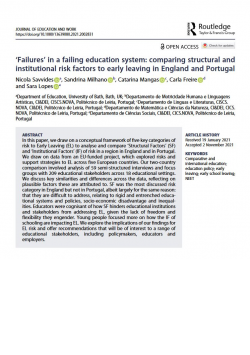
‘Failures’ in a failing education system: comparing structural and institutional risk factors to early leaving in England and Portugal
Year: 2021
Authors: NicolaSavvides, Sandrina Milano, Catarina Mangas, Carla Freire & Sara Lopes
DOI: https://doi.org/10.1080/13639080.2021.2002831
Link: https://doi.org/10.1080/13639080.2021.2002831
Keywords:
In this paper, we draw on a conceptual framework of five key categories of risk to Early Leaving (EL) to analyse and compare ‘Structural Factors’ (SF) and ‘Institutional Factors’ (IF) of risk in a region in England and in Portugal. We draw on data from an EU-funded project, which explored risks and support strategies to EL across five European countries. Our two-country comparison involved analysis of 59 semi-structured interviews and focus groups with 209 educational stakeholders across 18 educational settings. We discuss key similarities and differences across the data, reflecting on plausible factors these are attributed to. SF was the most discussed risk category in England but not in Portugal, albeit largely for the same reason: that they are difficult to address, relating to rigid and entrenched educational systems and policies, socio-economic disadvantage and inequalities. Educators were cognisant of how SF hinders educational institutions and stakeholders from addressing EL, given the lack of freedom and flexibility they engender. Young people focused more on how the IF of schooling are impacting EL. We explore the implications of our findings for EL risk and offer recommendations that will be of interest to a range of educational stakeholders, including policymakers, educators and employers.
![[DEV] Orienta4YEL](https://www.orienta4yel.eu/public/img/logo-horizontal.svg)






